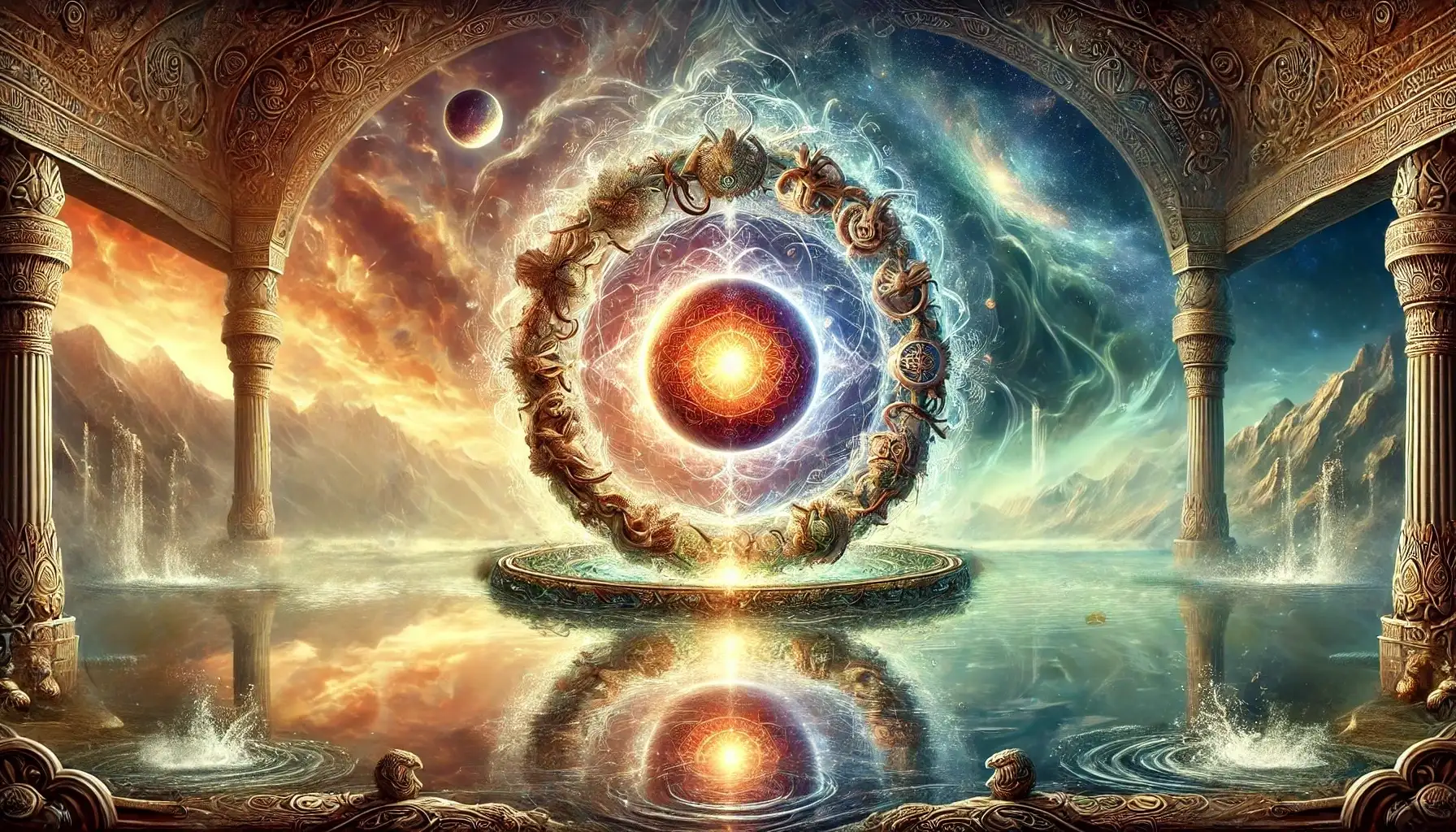The Birth of Osiris and the Seeds of Envy
In the time before time, when gods still walked among mortals, Osiris was born under the celestial gaze of Nut, the Sky Mother, and Geb, the Earth Father. His birth was not singular but part of a divine cascade, for he emerged alongside his siblings: the stern Seth, the luminous Isis, and the shadow-cloaked Nephthys. From the moment of his arrival, Osiris carried the aura of kingship. His emerald eyes mirrored the fertile Nile, and his voice resonated with the harmony of sistrums, commanding reverence and awe.
Osiris grew into a ruler who reigned with wisdom and compassion. Under his guidance, Egypt flourished. He taught mortals the arts of agriculture, the mysteries of writing, and the rites of the gods. The barren lands yielded bountiful harvests, and the people sang songs of gratitude beneath the stars. Yet, within Seth, the god of storms and chaos, a tempest of envy brewed. He saw his brother not as a beacon of light but as a rival whose brilliance eclipsed his own shadow.
The Conspiracy of Seth
Seth, cunning and relentless, wove his jealousy into a plot as intricate as the papyrus reeds by the Nile. He crafted a chest of unparalleled beauty, measured precisely to Osiris’s stature. At a grand feast held under the waning moon, Seth presented the chest as a gift, declaring it would belong to whomever it fit perfectly.
The gods and mortals alike marveled at the chest’s gilded carvings and lapis lazuli inlays. One by one, they lay in it, laughing as their forms failed to match its dimensions. When Osiris reclined within, the chest embraced him perfectly, as if carved by fate itself. Before Osiris could rise, Seth’s followers sprang forth, sealing the lid with molten lead. They cast the chest into the Nile, its surface rippling with the cries of those who witnessed the betrayal.
Isis’s Quest
Grief-stricken but resolute, Isis donned the mantle of a wanderer. She scoured the lands and waters, her tears mingling with the Nile’s currents. Her journey led her to Byblos, where the chest had drifted ashore and become enshrined within a great tree. The tree’s fragrant wood had been felled to support the palace of a foreign king.
Disguised as a healer, Isis entered the palace and won the favor of the queen by nursing her ailing child. In gratitude, the queen allowed Isis to take the wooden pillar housing the chest. Returning to Egypt, Isis opened the chest and cradled Osiris’s lifeless body, her wails piercing the heavens. Yet her mourning was not in vain, for she possessed ancient magic that could defy death itself.
The Fragmentation of Osiris
Seth, ever vigilant, discovered Isis’s attempt to restore Osiris. In a fit of unbridled rage, he tore Osiris’s body into fourteen pieces and scattered them across Egypt, each fragment hidden in the desolate and sacred places of the land. Isis, undeterred, set forth again, her determination burning brighter than the desert sun.
With Nephthys by her side, Isis roamed the land, transforming herself into a kite to traverse the winds and search the hidden places. She recovered each fragment, her hands trembling with a mixture of sorrow and resolve. At last, she reassembled Osiris’s body, save for one part—his phallus, swallowed by a fish in the Nile’s depths. Undeterred, Isis fashioned a golden replica, completing the body with divine artistry.
The Resurrection and the Birth of Horus
Through sacred incantations and the breath of her own life force, Isis restored Osiris. He rose, not as he had been, but as a god of the Duat, the underworld. His voice, now tinged with the echoes of eternity, declared him the judge of souls, guiding the dead through the Hall of Ma’at.
Before Osiris descended to his new realm, Isis conceived a child by him—Horus, the falcon-headed god destined to avenge his father. She bore him in secrecy within the marshes of the Nile Delta, protecting him from Seth’s wrath. The reeds whispered lullabies to the infant god, and the stars watched over him like sentinels.
The Triumph of Horus
Horus grew under Isis’s vigilant care, learning the arts of war and wisdom. When he came of age, he challenged Seth for the throne of Egypt. Their battle raged across the heavens and earth, taking the forms of storms and beasts. Horus’s falcon cry pierced the skies, while Seth’s roars shook the mountains.
The gods convened to arbitrate the conflict, and after many trials, they declared Horus the rightful king. Seth was cast down but not destroyed, for chaos could never be fully vanquished. It remained a necessary counterbalance to order, a reminder of the eternal dance between creation and destruction.
The Eternal Legacy
With Horus’s ascension, the land of Egypt returned to prosperity. The Nile flowed with renewed vigor, its waters reflecting the heavens’ light. Mortals built temples to honor Osiris, Isis, and Horus, their prayers rising like incense to the gods.
Osiris ruled the Duat with wisdom, weighing the hearts of the dead against the feather of Ma’at. Those found worthy walked in fields of eternal peace, while the unworthy were devoured by Ammit, the soul-eater. Isis became a symbol of maternal devotion and magical prowess, her name invoked by those seeking solace and protection.
The Final Vision
One night, beneath the full moon’s silver glow, a priestess of Isis knelt at an altar, her hands trembling as she lit a lotus-shaped lamp. She whispered prayers of gratitude for the balance restored by Osiris and Horus. In the flickering light, a vision appeared: Osiris standing tall, his green skin shimmering like the fertile floodplains, and Isis by his side, her wings unfurled as if to shield the world from harm.
Beyond them, Horus soared into the starlit expanse, his falcon eyes surveying the earth. In the distance, Seth’s shadow lingered, a dark horizon beneath the rising sun. Yet, even in his shadow, there was a strange beauty—a reminder that the cosmos thrived not in perfection, but in the harmony of opposites.
As the vision faded, the priestess felt a tear roll down her cheek. It was not a tear of sorrow, but of awe—a silent acknowledgment of the eternal cycle. She rose, leaving the temple to greet the dawn, the taste of lotus incense still on her lips. Behind her, the lamp flickered once, then went out, leaving only the moonlight to illuminate the sacred space.



